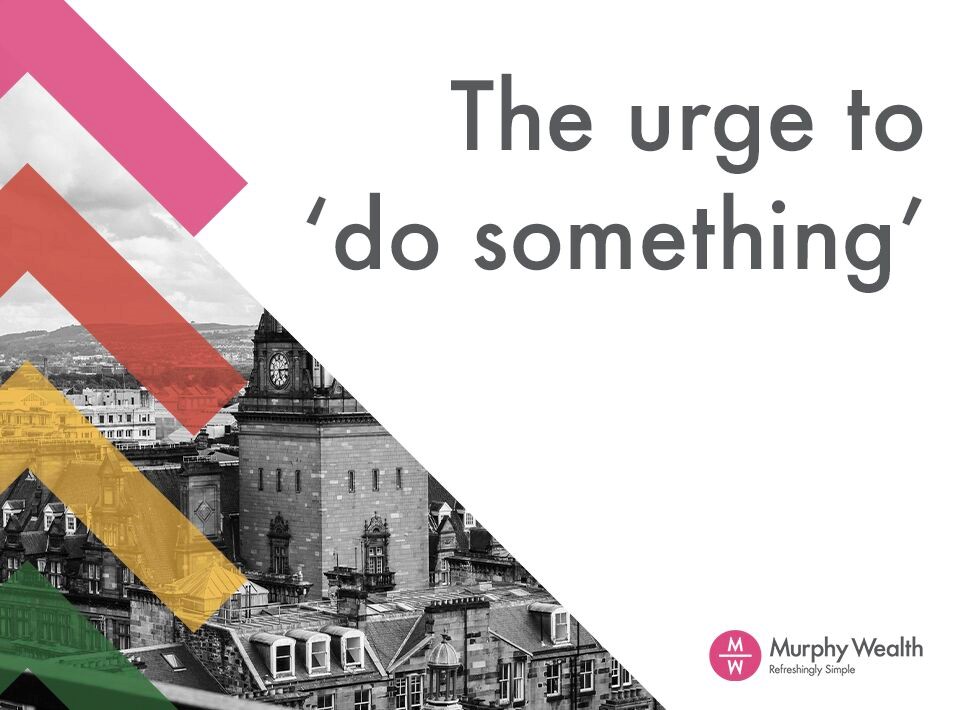The urge to 'do something'

We’re still deep in the pandemic, this is a once in a lifetime public health emergency. In the investing world this is called a ‘Black Swan’, something you thought was impossible, until you see one.
We don’t like to focus too much on investments, as we always say to our clients, it’s only one of the tools that can be used as part of your lifestyle plan. The economic and societal reactions to the Black Swan are, however, worth noting and discussing.
How should we react?
In times of heightened if not unprecedented levels of uncertainty everybody has a significant urge to ‘do something’ – it is human nature to want to fix something if it goes ‘wrong’. The toilet paper and now general panic buying, against best advice from the government and the supply chain managers, are testimony to this very human notion.
We all foreseen a storm coming. But now that it’s here, it’s the time to sit tight, wait for the blizzard to pass and most importantly, be patient.
We’ve felt the same pressure as a business. Even if it runs against the human desire to intervene, ‘doing nothing’ is widely accepted (in some cases). Trying to ‘time- the-market’ and trade on short term swings is the reserve of the very highest risk seekers amongst investors.
In psychology, there’s a phenomenon known as hindsight bias or, more colloquially, the “I knew it all along” phenomenon. It’s exactly what it sounds like: people tend to look at past events and say to themselves, “All the signs were there! I should have seen that coming.” And before you know it, they’re trying to predict the future based on past events rather than the facts. That’s why making future predictions is far harder than hindsight bias would lead you to believe.
As long-term planners, we are not drawn into ‘gambling’ as we firmly believe that ‘time in the markets’ will once again prevail, just as it has done during all previous ‘apocalyptic’ looking global crises.
Stock markets have acted as expected, negatively.
The stock market is a story, the story changes, the prices change. Now the story is very negative, when the story changes the prices will change again. The stock market overreacts in both directions. This is because the markets feed off two powerful human emotions, that of greed and fear.
As Warren Buffett says:
"The stock market is a device for transferring money from the impatient to the patient."
Successful investors are patient, failed investors are impatient.
The nature of risk is that you don’t see it coming.
Now for some good news.
Going into this crisis we could not have been in a better position economically. It would be a shame to overlook the progress we have made. We're at a decade plus of prosperity, unemployment at historical lows, businesses with more cash than they’ve ever had and the personal balance sheets of individuals at a high. There’s never a ‘good time’ for a pandemic. However, it seems sensible to remain positive since we are in a globally connected world and have all the utilities and resources to address this head-on.
There will be some good consequences from the crisis, such as:
- conscious spending, do I really need these things/items in my life (don't just panic buy!).
- focusing on what’s important - people to spend your time with, places to go and things to achieve.
- a focused desire to becoming financially free sooner (investing more from a younger age).
We’re here to help, even if it's just a second opinion
If any of your friends, family or colleagues wish to speak to a financial professional at this unprecedented time, pass on our details. We have a professional obligation to help as many people as we can to make wise financial decisions.
Stay safe, stay positive and know that together we are a powerful force that a storm might struggle against. After all, infectious diseases appear to be a 'constant companion':

History of Pandemics visual chart provided by The Visual Capitalist
*Please be advised that the above should not be taken as formal advice. Always speak to your financial planner if you have any questions about your personal circumstances.



